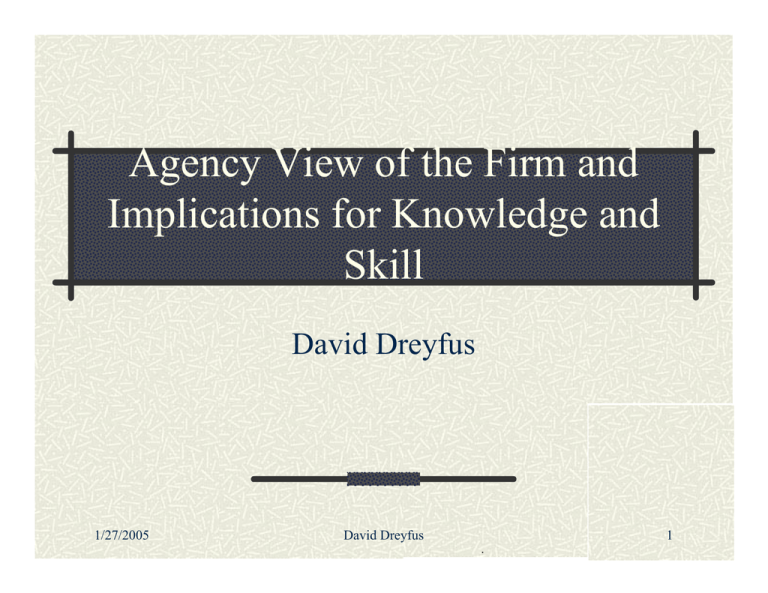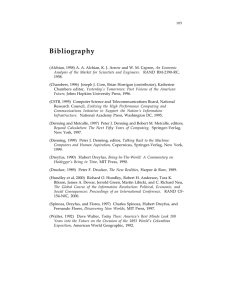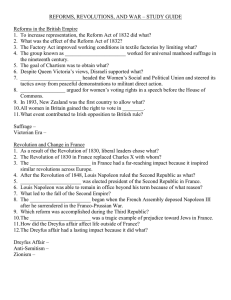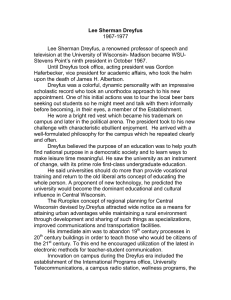Agency View of the Firm and Implications for Knowledge and Skill David Dreyfus
advertisement

Agency View of the Firm and Implications for Knowledge and Skill David Dreyfus 1/27/2005 David Dreyfus 1 . Knowledge Problem of a rational economic order is determined precisely by the fact that the knowledge of the circumstances of which we must make use never exists in concentrated or integrated form, but solely as the dispersed bits of incomplete and frequently contradictory knowledge which all the separate individuals possess. (von Hayek) 1/27/2005 David Dreyfus 2 Hierarchy The likelihood that the top decision maker is so removed from reality is the most fundamental reason for diminishing returns to scale. (Williamson) 1/27/2005 David Dreyfus 3 Moral Hazard Incentives are the essence of economics Edward P. Lazear What are the standard assumptions? 1/27/2005 David Dreyfus 4 Moral Hazard Incentives are the essence of economics Edward P. Lazear What are the standard assumptions? Goods and services are: Specific Observable attributes Costlessly verifiable 1/27/2005 David Dreyfus 5 Moral Hazard: definition Post contractual opportunism that arises because actions that have efficiency consequences are not freely observable When can it occur When the standard assumptions are violated. What are some examples? 1/27/2005 David Dreyfus 6 Moral Hazard: Consequences Efficiency loss: impair mutual agreement Conservative medicine Product quality CEO behavior Debt financing (OPM) Less insurance / loss of social benefit Influence costs 1/27/2005 David Dreyfus 7 Moral Hard: Solutions Goal congruence: incentive contracts and monitoring Risk asymmetry Cost / benefit of incentive and efficiency loss Reputation mechanisms Bonds Bureaucracy 1/27/2005 David Dreyfus 8 Risk Sharing and Incentives Principal-agent problem Shift risk if agent can’t be monitored Informativeness principle Incentive-intensity principle Monitor intensity principle Equal compensation principle 1/27/2005 David Dreyfus 9 Rents and efficiency Quasi-rents Value of reputation Incentives and monitoring are substitutes Reputation requires monitoring Institutional response Competition for rents: influence costs 1/27/2005 David Dreyfus 10 Decentralized Information Bounded rationality and limited information processing make organizations interesting Constrained optimization (satisficing) Elucidate the constraints Coordination costs (Malone) 1/27/2005 David Dreyfus 11 Decentralized Information Non-optimal decision rules Complexity Garbage Can (Cohen and March) Communication constraints and bounded rationality 1/27/2005 Fundamental limit is human attention (Simon) David Dreyfus 12 Markets versus Planning Constrained optimization Socialism requires too much information transfer 1/27/2005 David Dreyfus 13 Firm versus Market Coase (1937) Nobel prize. Transaction Economics Williamson (1975, 1985) Firm boundary and transaction economics. Information processing needs lead to decentralization, coordination costs bound the firm (Lawrence and Lorsch) 1/27/2005 David Dreyfus 14 Computer metaphor Decomposition economizes on communication and processing. Communication constraints Iterative procedure Team theory. Statistical decision theory. Pooled information without full disclosure Incentive constraints Computational constraints 1/27/2005 David Dreyfus 15 Computer metaphor Decentralized computing Trade-off delay and efficiency: serial and parallel processing. Capacity utilization Coordination costs (dynamic environment) Managerial delay (Robinson, 1958; van Zandt) Incomplete contracts (Brynjolfsson) 1/27/2005 David Dreyfus 16 Jensen and Meckling Two types of knowledge General: inexpensive Specific: expensive Collocate decision and knowledge Particulars of time and place Alienable rights. Court enforced Firms suppress alienability Tradeoff between centrality and decentrality 1/27/2005 David Dreyfus 17 Total Organizational Costs Costs to poor info Agency Costs Optimal 1/27/2005 David Dreyfus 18 Baker and Jorgensen Question: impact of volatility on incentive contract Insurance for risk averse Importance of managerial behavior Insight: two types of uncertainty That which impacts decisions (volatility) That which doesn’t (noise) 1/27/2005 David Dreyfus 19 Autor, Levy, and Murnane Question: What is it that computers do? Replace repetitive manual and cognitive tasks. Rules-based Symbolic processing Environmentally constrained Both low and high skill work is replaced 1/27/2005 David Dreyfus 20 Economic argument Insight: repetitive and non-repetitive skills are complements. Decreasing costs of one, increase marginal product of the other. 1/27/2005 David Dreyfus 21 Analysis DOT task definitions Census of who works in what categories Task change, not educational level change College provides more non-routine cognitive skill development Types of manual tasks performed do not change. No shift. 1/27/2005 David Dreyfus 22 Results Task shifts within industry Not between industry employment shift Computer technology explains 30-50% increase in the rate of growth. Importance of skilled work was increasing before computers. 1/27/2005 David Dreyfus 23 Locus of decision making How do information technologies affect locus of decision making and control? Monitoring and contracting. Agency. Knowledge (specific, general) Information flow Coordination Noise and volatility 1/27/2005 David Dreyfus 24 Skill level (Cat’s Cradle) Task type expansion (AI, Expert Systems) Skill versus Cognition Complement versus substitute Design platform 1/27/2005 Skill to use. David Dreyfus 25





